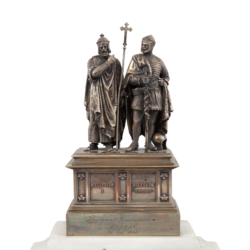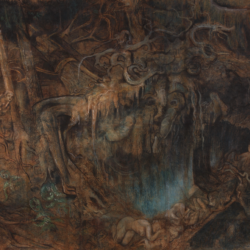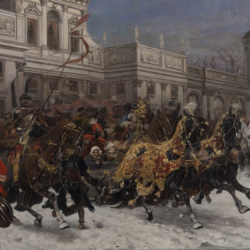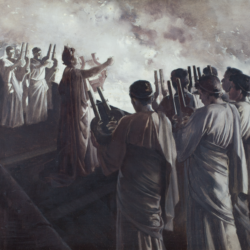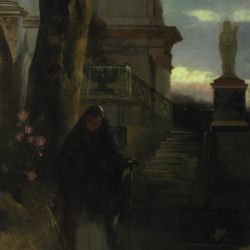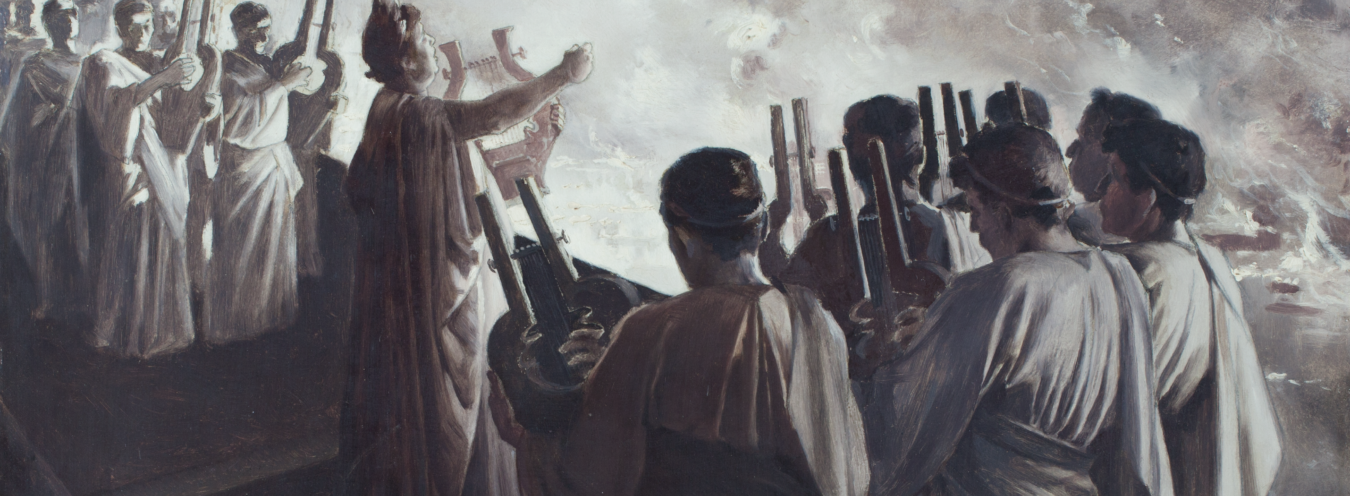
“Quo Vadis” and the Issue of Christianity
There is no doubt that interpreting Sienkiewicz’s work is incomplete without due consideration given to the Quo Vadis novel: his most “universalist” piece of writing and the one closest to Voegelin’s “epiphany of transcendent order.” Here again, as he did when representing Poland’s turbulent 17th century for his contemporaries, the writer tried to remain as objective as possible and make his characters complex, evolving, and all too often full of qualms. The artistic vision that inspired Sienkiewicz to use antiquity as the time setting for the novel may also be given different readings.
Given the call for approaching Sienkiewicz’s oeuvre as more intricate than it is usually perceived to be and avoiding interpretive oversimplifications (and in light of some scholarly theses about the ambiguity of the writer’s conversion and his going beyond the boundaries of rigid doctrinal divisions), one could wonder how the grand topic of the Roman Empire and Nero’s persecution of Christians may be reconciled with the novelist’s earlier anticlericalism[1]. In addition, Quo Vadis seems to have been Sienkiewicz’s response to what he saw as the inadequacy of the efforts of the Church to bring Poles together when the nation’s survival was at stake, and a crisis of values threatened its integrity. Voegelin outlined a similar situation in the history of Christianity from the Protestant dissent onwards:
The Church has abandoned its spiritual leadership insofar as it has left postmedieval man without guidance in his endeavors to find meaning in a complex civilization which differs profoundly in its horizons of reason, nature and history from the ancient that was absorbed and penetrated by the early Church. In the face of this abandonment of the magisterium it is futile when Christian thinkers accuse the superbia of modern man […]. From the dissatisfaction of being engaged in a civilizational process without meaning there are engendered attempts, beginning with Voltaire, at a reconstruction of meaning through the evocation of a new “sacred history.”[2]
Apart from the above-described progressive “loss of meaning” (which both necessitated and incited the constitutional development of the “earthly order” embodied in, for example, the encyclopedism of the Enlightenment and positivism), Voegelin identified an even greater menace: turning the universe of Christian symbols into a mere myth, which inevitably rendered it invalid and history-bound, potentially making the symbols tantamount to those of any other religion:
In the age of Christ and the centuries of early Christianity, this language [of Christian religious symbolism – M.P.] was not a “myth” but the exact terminology for the designation of religious phenomena. It has become a “myth” as a consequence of the penetration of our world by a rationalism which destroys the transcendental meanings of symbols taken from the world of the senses. In the course of this “de-divinization” […] of the world, sensual symbols have lost their transparency for transcendental reality; they have become opaque and are no longer revelatory of the immersion of the finite world in the transcendent[3].
It seems plausible to hypothesize that Sienkiewicz resorted to narrative settings in a distant past in an attempt to recreate and show the relevance of the process in which history and human existence are endowed with a new meaning; in the novel, Christianity triumphs over ancient Rome by virtue of its new interpretation of reality. One could see it as a paradoxical (deliberate or not) following of post-Enlightenment Rationalists and positivist Scientists in their effective efforts to replace the experience of the transcendent order with the figure of the “genealogy of order” (or value systems)[4]. The key symbolic device in the figure relies on the fact that two incompatible orders (factual reality versus transcendence) are integrated into one earthly order through a “chain of symptoms” for a given phenomenon, which are linked in a horizontal (as opposed to vertical) cause-and-effect string. In the case of Sienkiewicz, we should rather talk of the “genealogy of moral authority,” whose more-than-human transcendental source is recognized and fully respected.
One can then safely say that Quo Vadis is as much a historical novel as a modern voice in the discussion on the state of European culture and civilization towards the end of the 19th century. However, Sienkiewicz was truly in his element not when he was building an elaborate discourse, but when narrating a story. That is why it is not any specific passage from the novel, not a speech uttered by a “saintly man” or martyr, but the plot in its entirety that convincingly proves the thesis about the end of Christianity or the “Death of God” to be wrong – simply because of the break in moral consciousness of humanity effected by the Christian religion. According to Sienkiewicz, this breakthrough could never be reversed or made historically or morally relative in any way. After all, it is not possible to announce the end of anything that belongs to the historical order as an eschatological fact, an “event in eternity.”
By portraying a handful of persecuted Christians against the Roman Empire’s order and civilization, Sienkiewicz aptly demonstrates the incompatibility of the human and eschatological orders. Such a reading is supported in particular by the character of Marcus Vinicius, a Roman patrician who is the embodiment of knightly qualities and virtues, a perfect paragon of a polytheistic civilization based on tradition and a naturalistic religious system. Vinicius is gradually led to abandon his belief in the superiority of the cultural system that shaped him and eventually converts to Christianity. The character’s development illustrates the radicalism of the Christian cultural revolution, founded basically on one axiom: the victims always have the moral upper hand over their tormentors.
There is one more important aspect to the “Narrative of the Time of Nero,” as Quo Vadis is subtitled. Doubtlessly, the character of the depraved Roman emperor potentially carries many actualizing interpretations, including political ones. From the perspective of political theology, Sienkiewicz’s Nero can also be seen as a memento that warns the reader of a new, emergent generation of immoralist leaders in Europe’s nihilist era. The paradoxical return to Plato’s concept of ruler-cum-philosopher-cum-dictator was noticed by Voegelin in post-Enlightenment political treatises:
The legislator, as we have seen, provides in his person the directive center of which the soul of the man of passion and interest has been deprived. […] The spiritual drama of salvation which takes place in the Christian soul has become externalized in the drama of a society under the leadership of a “legislator.”[5]
The thinker then introduces the term “social immanentism” as “the externalization of processes of the soul and their enactment on the stage of society.”[6]
Irrespective of how to interpret the character of Nero in Quo Vadis, it must be stated that – often in contrast to other Polish historical novelists of that time – Sienkiewicz was fully aware of the necessity, and the need, to subordinate his gift for epic style to the figures of the modern imagination. That is why the “historical dramatization” of spiritual processes (or, in more modest terms, the psychological dramas of human souls) was successfully employed by the writer to remind his readers about imponderabilia.
Przypisy
- Obviously, Sienkiewicz’s anticlericalism did not automatically spell a hostile attitude to Christianity itself (perhaps apart from some very early assertions). In a letter to his friend, historian Karol Potkański, Sienkiewicz stated, “It is deplorable when a society cherishes the church more than Christ, observance more than the Christian spirit.” (H. Sienkiewicz, Listy [Letters], edited by M. Bokszczanin, vol. 3, part 3, Warsaw 2007, p. 113; trans. J. M.).
- E. Voegelin, op. cit., p. 23.
- Ibidem, p. 21.
- A very pertinent quote from Voegelin is worth citing here: “The inversion of direction becomes now established, under the title of genealogy, as the principal instrument for interpreting the internal order of human nature” (op. cit., p. 69; emphasis M. P.). See footnote 24 above.
- E. Voegelin, op. cit., p. 71. The “modern legislator” is also compellingly discussed in a more substantial context by Istvan Bibó, a Hungarian historian of ideas and politics. Such legislator-usurpers, particularly numerous in Central European countries in the “era of democracy” are ironically called “great realists” and described as follows: “Descending from aristocratic heights or ascending on the wings of democratic representation, these politicians, beside their undoubted talents, had cunning and a bent for aggression that made them perfectly suited for running and epitomizing anti-democratic governments and aggressive political pseudo-constructs in the midst of democratic trappings” (I. Bibó, The Art of Peacemaking: Political Essays, translated by P. Pásztor, New Haven & London 2015, p. 152).
- Ibidem.

